When it comes to picking the best sunscreen for Indian men, there are a few factors to consider. Here are some tips to help you make the right choice:
-
Choose a sunscreen with a high SPF: Look for a sunscreen with an SPF (Sun Protection Factor) of at least 30, which will provide adequate protection against the harmful UV rays of the sun.
-
Pick a broad-spectrum sunscreen: Make sure that the sunscreen you choose provides broad-spectrum protection, which means it protects against both UVA and UVB rays. UVA rays can penetrate deep into the skin and cause premature aging, while UVB rays can cause sunburn.
-
Check the ingredients: Avoid sunscreens that contain harmful chemicals such as parabens, oxybenzone, and octinoxate. Instead, look for natural ingredients like zinc oxide and titanium dioxide.
-
Consider your skin type: If you have oily or acne-prone skin, look for a lightweight, oil-free sunscreen that won't clog your pores. If you have dry skin, choose a sunscreen that contains moisturizing ingredients.
-
Look for water-resistant sunscreen: If you're going to be swimming or sweating, choose a water-resistant sunscreen that will stay on your skin longer.
-
Consult with a dermatologist: If you have sensitive skin or any skin conditions, it's always best to consult with a dermatologist to find the best sunscreen for your skin type.
Overall, the best sunscreen for Indian men should offer broad-spectrum protection, have a high SPF, be free of harmful chemicals, and be suitable for your skin type. Don't forget to reapply sunscreen every 2-3 hours for maximum protection!
How does sunscreen work?

Sunscreen works by blocking or absorbing the harmful ultraviolet (UV) rays from the sun. These UV rays are classified into two types: UVA and UVB. UVA rays are responsible for aging the skin and causing wrinkles, while UVB rays are responsible for causing sunburns and increasing the risk of skin cancer.
Sunscreen contains active ingredients that either physically block or chemically absorb UV rays. Physical blockers such as zinc oxide and titanium dioxide form a barrier on the surface of the skin that reflects and scatters UV rays, preventing them from penetrating the skin. Chemical absorbers such as avobenzone and oxybenzone absorb UV rays and convert them into heat, which is then released from the skin.
The effectiveness of a sunscreen is measured by its sun protection factor (SPF), which indicates how much longer the sunscreen will protect the skin from sunburn compared to unprotected skin. For example, an SPF 30 sunscreen will protect the skin for 30 times longer than it would without sunscreen. It is important to choose a sunscreen with an appropriate SPF for your skin type and activity level, and to reapply it regularly to maintain its effectiveness.
Broad-spectrum sunscreen benefits
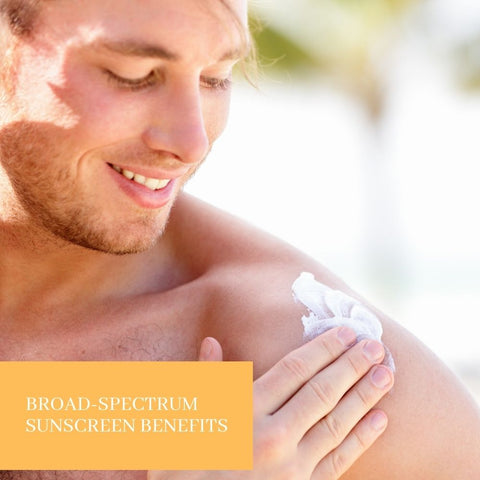
Broad-spectrum sunscreen has several advantages for protecting your skin from the sun's harmful ultraviolet (UV) radiation. Here are some major advantages:
-
Broad-spectrum sunscreen protects the skin against both UVA and UVB rays. Sunburn is caused primarily by UVB rays, which can penetrate the skin's outer layer (epidermis). Using a broad-spectrum sunscreen can help prevent sunburn and lower the risk of skin cancer, such as basal cell carcinoma, squamous cell carcinoma, and melanoma.
-
UVA rays penetrate deeper into the skin (dermis) and cause premature ageing, such as wrinkles, fine lines, age spots, and sagging. UVA rays can also suppress the immune system, raising the risk of skin cancer. Broad-spectrum sunscreen reduces UVA rays and protects against photoaging and long-term sun damage.
-
Sun exposure is one of the leading causes of premature skin ageing. UV radiation can degrade collagen and elastin fibres, resulting in loss of skin elasticity, wrinkles, and sagging. By shielding the skin from UVA and UVB rays, broad-spectrum sunscreen helps prevent photoaging and maintain a more youthful appearance.
-
The risk of developing skin cancer, including melanoma and non-melanoma (squamous cell carcinoma and basal cell carcinoma), rises with prolonged exposure to UV radiation. Regular application of broad-spectrum sunscreen lowers this risk by shielding skin cells' DNA from UV radiation and preventing damage.
-
Sunburn is an obvious indicator of UV-induced skin damage. It may result in skin peeling, redness, swelling, and pain. High sun protection factor (SPF) broad-spectrum sunscreen offers extra defence against UVA-induced skin damage in addition to helping prevent sunburn by blocking UVB rays.
-
Sun exposure can cause uneven pigmentation, dark spots, and hyperpigmentation, particularly on the face, neck, and hands. Broad-spectrum sunscreen prevents the formation of dark spots and promotes a more even skin tone by inhibiting UV-induced melanin production and pigmentation.
-
Including broad-spectrum sunscreen in your daily skincare routine improves overall skin health and lowers the risk of developing sun-related skin conditions such as actinic keratosis, sunburn, premature ageing, and skin cancer. It is a necessary step in maintaining healthy, radiant skin in the long run.
Mineral vs. chemical sunscreen
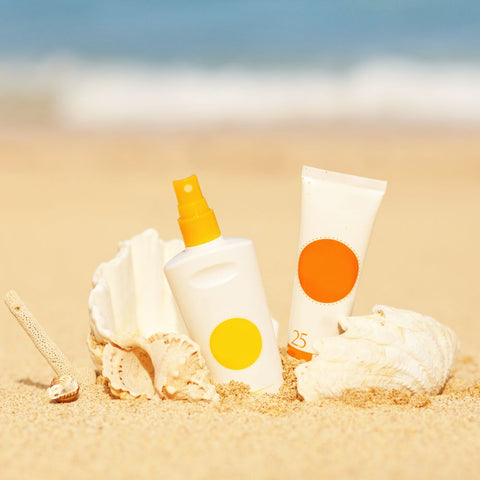
Mineral and chemical sunscreen formulations provide sun protection through different mechanisms. Here's a comparison between mineral and chemical sunscreens:
-
Active Ingredients:
-
Mineral sunscreens: Sometimes referred to as physical sunscreens, mineral sunscreens are made with active mineral ingredients like titanium dioxide and/or zinc oxide. These minerals function by physically absorbing or reflecting UV rays away from the skin while they are residing on the skin's surface.
-
Chemical Sunscreens: Organic (carbon-based) chemicals like octocrylene, oxybenzone, avobenzone, and octinoxate are found in chemical sunscreens. These substances take in UV rays and transform them into heat, which is subsequently expelled from the skin.
-
Sun Protection Spectrum:
-
Mineral Sunscreens: Mineral sunscreens protect against both UVA and UVB radiation. Zinc oxide and titanium dioxide provide strong UV protection throughout the whole spectrum.
-
Chemical Sunscreens: Chemical sunscreens may provide broad-spectrum protection, but their efficiency varies according to the exact combination of active chemicals utilised in the formulation. Some chemical filters only block UVB rays and require additional components or combinations to give appropriate UVA protection.
-
Skin Sensitivity:
-
Mineral Sunscreens: Mineral sunscreens are often regarded as mild and appropriate for sensitive or allergy-prone skin. Zinc oxide and titanium dioxide have a lower risk of causing skin irritation or allergic responses than chemical filters.
-
Chemical Sunscreens: Some people may develop skin irritation or allergic reactions after using chemical sunscreens, especially if they have delicate skin or are allergic to specific chemical compounds. When chemical filters are put near the eyes and skin, they might irritate.
-
Application and Appearance:
-
Mineral Sunscreens: Mineral sunscreens generally leave a visible white or opaque deposit on the skin due to the reflecting nature of zinc oxide and titanium dioxide. However, newer formulas frequently include micronized or nano-sized particles, which blend more easily into the skin.
-
Chemical Sunscreens: Chemical sunscreens tend to have a lighter texture and are easier to apply without leaving a white cast. They are often preferred for daily use under makeup or during outdoor activities where appearance and texture are important.
-
Environmental Impact:
-
Mineral Sunscreens: Mineral sunscreens are deemed environmentally benign because they are not harmful to marine life or coral reefs. Zinc oxide and titanium dioxide are biodegradable and do not cause coral bleaching or environmental damage.
-
Chemical Sunscreens: Some chemical sunscreen chemicals, including oxybenzone and octinoxate, have been found to harm coral reefs and marine ecosystems. These chemicals can build up in rivers and lead to coral bleaching, thus, some regions have restricted their usage of sunscreen products.
UV protection levels in sunscreen
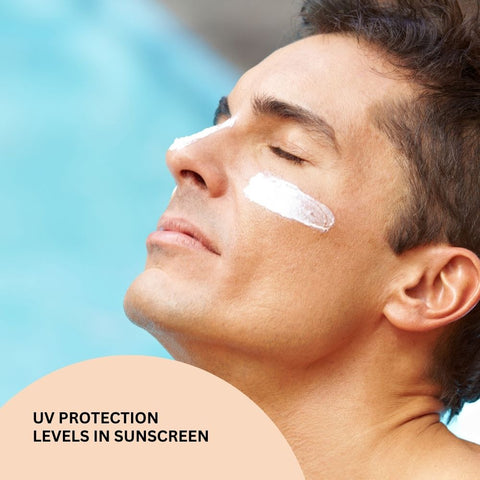
The Sun Protection Factor (SPF) and the indication of broad-spectrum coverage are commonly used by sunscreen products to indicate the degree of UV protection they offer. Here's what UV protection means for each of these factors:
-
Sun Protection Factor (SPF):
-
SPF measures how well a sunscreen protects against UVB rays, which are the primary cause of sunburn and contribute to the risk of skin cancer.
-
The SPF number indicates how long it takes for skin to burn when using sunscreen versus not using sunscreen. For example, if it takes 10 minutes for your skin to burn without sunscreen, using an SPF 30 sunscreen allows you to stay protected for 30 times as long (300 minutes or 5 hours) in the same conditions.
-
Higher SPF values indicate greater UVB protection. SPF 30 is deemed adequate for daily use, while SPF 50 or higher is advised for prolonged sun exposure or people with fair or sensitive skin.
-
Broad-Spectrum Coverage:
-
Broad-spectrum sunscreen is effective against both UVA and UVB rays. UVA rays promote skin ageing (photoaging) and can penetrate deeper into the skin, whereas UVB rays primarily cause sunburn and can lead to skin cancer.
-
Look for sunscreen labels that say "broad-spectrum" to ensure protection from both UVA and UVB rays. This provides comprehensive protection from sun damage, including premature ageing and skin cancer.
It is important to note that SPF is primarily used to measure UVB ray protection, so even high SPF sunscreens may not provide adequate UVA ray protection without broad-spectrum coverage. As a result, choosing a sunscreen with both high SPF and broad-spectrum protection is critical for complete UV protection.
How to choose the right sunscreen
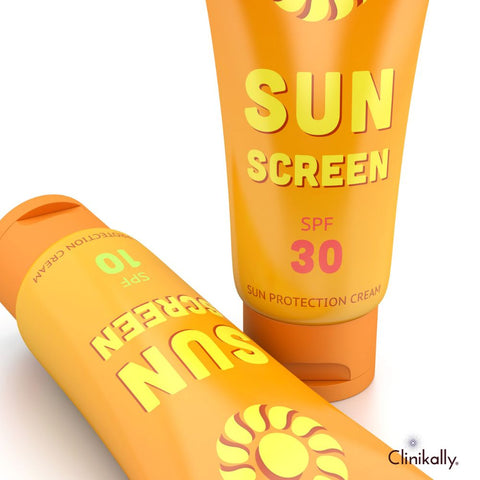
Choosing the right sunscreen can be a bit overwhelming with so many options available in the market. Here are some tips that can help you choose the right sunscreen:
-
Look for broad-spectrum protection: Choose a sunscreen that offers broad-spectrum protection, meaning it protects against both UVA and UVB rays. UVA rays can penetrate deeper into the skin and cause aging and skin damage, while UVB rays cause sunburns.
-
Check the SPF: Sun Protection Factor (SPF) measures the amount of UVB protection a sunscreen provides. Choose a sunscreen with an SPF of at least 30. SPF 30 blocks about 97% of UVB rays, while higher SPFs provide only a slightly higher level of protection.
-
Consider your skin type: If you have oily skin, look for a lightweight, oil-free sunscreen. If you have dry skin, look for a moisturizing sunscreen that contains ingredients such as hyaluronic acid or glycerin. If you have sensitive skin, choose a sunscreen that is labelled "fragrance-free" and "hypoallergenic."
-
Look for water-resistant: If you'll be sweating or swimming, choose a water-resistant sunscreen that can stay on your skin for up to 80 minutes in the water.
-
Check the expiration date: Sunscreens lose their effectiveness over time. Check the expiration date before buying and using a sunscreen.
-
Consult a dermatologist: If you have any concerns about choosing the right sunscreen for your skin, talk to a dermatologist. They can recommend a sunscreen that is suitable for your skin type and needs.
SPF rating explained
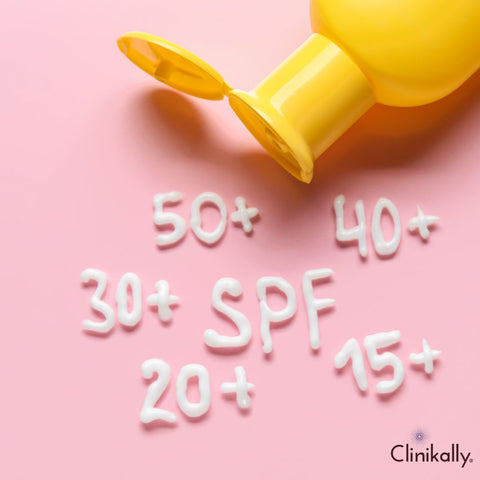
The Sun Protection Factor (SPF) rating on sunscreen products indicates how well they protect against UVB rays, which cause sunburn and contribute to the risk of skin cancer. Here's how the SPF rating works and how it affects sun protection:
-
SPF measures how effective sunscreen is at preventing UVB-induced skin damage when compared to unprotected skin. It represents the time it takes for skin to burn when using sunscreen versus not using sunscreen.
-
For example, if your skin burns in 10 minutes without sunscreen, using SPF 30 sunscreen allows you to stay protected for 30 times longer under the same conditions. So, if you apply SPF 30 sunscreen, it will take 300 minutes (or 5 hours) for your skin to burn.
-
It is important to remember that SPF is a measure of relative protection. It does not imply that you can stay in the sun for the entire time indicated by the SPF number without reapplying sunscreen or using other sun protection measures. Sweating, swimming, and towel-drying can all reduce the efficacy of sunscreen, so reapply it every two hours or more frequently as needed.
-
The SPF rating corresponds to the percentage of UVB rays blocked by the sunscreen. SPF 15 blocks roughly 93% of UVB rays, SPF 30 blocks about 97%, SPF 50 blocks about 98%, and SPF 100 blocks about 99% of UVB rays. While higher SPF numbers provide more UVB protection, the increase becomes marginal after SPF 50.
-
Keep in mind that individual factors such as skin type, sun sensitivity, amount of sunscreen applied, and frequency of reapplication can all influence the level of protection provided by sunscreen. Additionally, sunscreen should be used in conjunction with other sun protection measures, such as seeking shade, wearing protective clothing, and avoiding peak sun hours, for optimal sun safety.
Water-resistant sunscreen for men

Water-resistant sunscreen is an excellent choice for men who live an active lifestyle, enjoy outdoor activities, or simply prefer sunscreen that can withstand sweat and water. Here are some considerations and recommendations for men's water-resistant sunscreen:
-
Broad-Spectrum Protection: Look for water-resistant sunscreens that block both UVA and UVB rays. This ensures comprehensive protection against sunburn, premature aging, and skin cancer.
-
High SPF: To ensure optimal protection during outdoor activities, use a water-resistant sunscreen with a high Sun Protection Factor (SPF). SPF 30 or greater is suggested for prolonged sun exposure, especially if you plan to sweat or swim.
-
Sweat and Water Resistance: Choose sunscreens labelled "water-resistant" or "very water-resistant." These formulations are intended to remain effective even when exposed to sweat or water, making them ideal for activities such as sports, swimming, or working outside.
-
Non-Greasy Formulation: Look for water-resistant sunscreens with lightweight, non-greasy formulas that absorb quickly into the skin and leave no sticky or oily residue. Men prefer sunscreens that are comfortable and do not interfere with their daily activities or clothing.
-
Matte Finish: If you prefer a more natural or matte appearance, look into water-resistant sunscreens with matte finishes. These formulations can help to reduce shine and provide a smooth, matte finish that appears natural on the skin.
-
Long-Lasting Protection: Select a water-resistant sunscreen that provides long-lasting protection and does not require frequent reapplication, particularly during prolonged outdoor activities. However, reapply sunscreen every two hours, or more frequently if you sweat or swim.
Non-comedogenic sunscreen

Non-comedogenic sunscreens are ideal for people who suffer from acne or have oily or acne-prone skin. These sunscreens are designed to be lightweight and oil-free, lowering the risk of clogging pores and causing breakouts. Here are some recommendations for non-comedogenic sunscreens:
-
Look for sunscreens labelled "oil-free" or "non-comedogenic." These formulations are intended to provide sun protection without causing excess oil on the skin, which can lead to clogged pores and acne breakouts.
-
Choose non-comedogenic sunscreens that are lightweight, non-greasy, and absorb quickly into the skin without leaving a heavy or sticky residue. These formulations are gentle on the skin and will not contribute to shine or congestion.
-
Ensure that the non-comedogenic sunscreen provides broad-spectrum UVA and UVB protection. This protects the skin from sunburn, premature ageing, and skin cancer while also lowering the risk of post-inflammatory hyperpigmentation (PIH) in acne-prone skin.
-
Non-comedogenic sunscreens can contain either mineral (physical) or chemical (organic) UV filters. Some people with acne-prone skin may prefer mineral sunscreens containing zinc oxide or titanium dioxide, which are less likely to irritate or cause breakouts.
-
If you prefer a shine-free complexion, look for non-comedogenic sunscreens with a matte finish. These formulations help to absorb excess oil and provide a smooth, matte finish that looks natural on the skin.
-
Choose non-comedogenic sunscreens that do not contain potentially irritating or sensitising ingredients like fragrances, dyes, or alcohol. These ingredients can aggravate acne and inflammation in people with sensitive skin types.
Best Sunscreen for Indian men
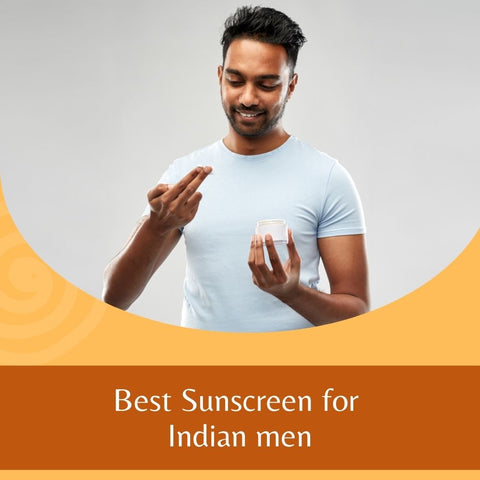
Choosing the best sunscreen for Indian men can depend on various factors such as skin type, level of sun exposure, personal preference, and budget. However, some general guidelines and recommendations for selecting the right sunscreen are:
-
Look for a broad-spectrum sunscreen: A broad-spectrum sunscreen protects against both UVA and UVB rays. Both types of rays can cause skin damage and increase the risk of skin cancer, so it's essential to choose a sunscreen that offers broad-spectrum protection.
-
Consider the SPF level: Sun Protection Factor (SPF) measures a sunscreen's ability to block UVB rays, which cause sunburn. Higher SPF values provide more protection, but experts recommend using a minimum of SPF 30.
-
Choose a water-resistant sunscreen: Sweating, swimming, or any activity that causes moisture on the skin can reduce the sunscreen's effectiveness. Therefore, it's best to select a water-resistant sunscreen to ensure protection during outdoor activities.
-
Consider your skin type: People with oily skin may prefer a lightweight, non-greasy sunscreen, while those with dry skin may prefer a more hydrating formula.
Some popular sunscreen brands in India that meet these criteria include:
It's essential to apply sunscreen correctly by covering all exposed skin and reapplying every two hours or after swimming or sweating. Additionally, it's crucial to combine sunscreen with other sun protection measures, such as wearing protective clothing, seeking shade, and avoiding sun exposure during peak hours.
Best sunscreen for dry skin

When looking for a sunscreen for dry skin, it's important to find one that will not only protect your skin from harmful UV rays, but also hydrate and nourish it. Here are a few options that might work well for you:
La Shield Sunscreen Gel : La Shield Sunscreen Gel fortified with SPF 40 provides outstanding broad-spectrum protection against ultraviolet UVA and ultraviolet UVB.
Best sunscreen for oily skin

When it comes to selecting a sunscreen for oily skin, you'll want to look for products that are labelled as oil-free, non-comedogenic, and lightweight. Here are some options that may work well for oily skin:
IPCA Acne-UV Gel SPF 30 : IPCA Acne-UV Gel SPF 30 is a broad spectrum sunscreen that provides a physical and chemical barrier against the sun to protect skin from UVA and UVB rays. It's non-comedogenic and shields your skin from UV rays. This sunscreen is appropriate for both normal and oily, acne-prone skin. It protects the skin from sun damage and other skin problems while also moisturising it to make it soft and smooth.
Best sunscreen for sensitive skin

Everyone interprets sensitive skin differently. Anyone with sensitive skin wants to make sure they're using products that won't irritate their skin, whether they have eczema, acne, rosacea, dryness, or just plain old irritation. When it comes to finding the best sunscreen for sensitive skin, it's important to look for products that are fragrance-free, hypoallergenic, and formulated with physical (mineral) sunscreen ingredients like titanium dioxide and zinc oxide rather than chemical ones. To explore our valuable products, kindly visit: https://www.clinikally.com/collections/sunscreens
Sun Protection Strategies Beyond Sunscreen

Aside from sunscreen, a range of sun protection techniques can help prevent sun damage, skin cancer risk, and premature ageing. Other than sunscreen, some effective ways to protect your skin from the sun include seeking shade, wearing protective clothing, sun protective accessories, planning outdoor activities wisely, limiting time in direct sunlight, using umbrellas and canopies, applying sunscreen to often-overlooked areas, being mindful of reflection, protecting children from the sun, and performing regular skin checks. By adopting these sun protection measures into your daily routine and outdoor activities, you may help limit UV damage, lower your risk of skin cancer, and keep your skin healthy and attractive for years to come.
Sunscreen application tips

Proper sunscreen application is vital for providing adequate sun protection while lowering the risk of sunburn, premature ageing, and skin cancer. To ensure you apply sunscreen correctly, choose the right sunscreen, apply generously, apply early and often, cover all exposed skin, use the two-finger rule, apply sunscreen to the scalp and hairline, reapply after swimming or sweating, avoid the eyes, and double-check the expiration date. By following these sunscreen application instructions, you can ensure optimal sun protection while reducing your risk of sunburn, premature ageing, and skin cancer. Include sunscreen in your regular skincare routine, especially for outdoor activities and sun exposure.
Reapplying sunscreen outdoors

Reapplying sunscreen outside is critical for ensuring adequate sun protection and reducing the risk of sunburn, premature ageing, and skin cancer. Here are some tips for properly reapplying sunscreen during outdoor activities:
-
Reapply sunscreen every two hours, or more frequently if you sweat profusely or swim. Sunscreen can wear off or become less effective over time, particularly after prolonged sun exposure or physical activity.
-
If you plan to swim, sweat, or participate in water activities, use a water-resistant sunscreen. Water-resistant sunscreens offer longer-lasting protection and are less likely to wash away when exposed to water.
-
Apply sunscreen liberally to all exposed skin areas at least 15 minutes before heading outside. This allows the sunscreen to absorb into the skin and provide maximum UV protection.
-
Make sure to apply sunscreen to all exposed skin areas, including the face, neck, ears, arms, legs, hands, and feet. Do not forget about frequently overlooked areas such as the tops of the ears, the back of the neck, and the tops of the feet.
-
Pay special attention to areas prone to sunburn or sun damage, such as the nose, shoulders, chest, and back. To maintain protection, apply sunscreen generously to these areas and reapply as needed.
-
Apply sunscreen liberally to ensure complete coverage. Most adults require about one ounce (roughly a shot glass full) of sunscreen to properly cover their entire body.
-
Apply sunscreen liberally to sensitive areas such as the lips, ears, scalp (if not covered by hair), and around the eyes (using a face sunscreen). To protect your lips from sunburn and dryness, use an SPF-containing lip balm.
-
If you are swimming or sweating, reapply sunscreen right after towel drying to ensure continuous protection. Water-resistant sunscreens can protect you while swimming, but they still need to be reapplied regularly.
-
If you are going to be outside, bring along a travel-sized or portable sunscreen. This makes it simple for you to reapply sunscreen throughout the day, even when you are not at home or do not have a full-sized bottle with you.
-
Check your sunscreen's expiration date and discard any expired or out-of-date products. Expired sunscreen may not provide adequate protection against sunburn and skin damage.
By following these tips and reapplying sunscreen regularly during outdoor activities, you can maintain optimal sun protection and protect your skin from the harmful effects of UV radiation.
Sun protection clothing and accessories
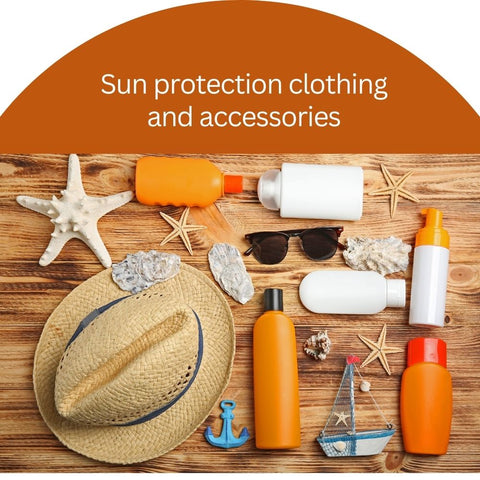
Sun protection clothing and accessories offer additional protection from harmful UV rays, lowering the risk of sunburn, premature ageing, and skin cancer. Here are some choices for sun protection clothing and accessories:
-
UPF Clothing: UPF (Ultraviolet Protection Factor) clothing is designed to block UV radiation and provide excellent sun protection. Look for clothing with a UPF rating, which indicates the amount of UV protection the fabric provides. UPF clothing comes in a variety of styles, such as shirts, pants, hats and swimwear.
-
Long-Sleeved Shirts: Wear lightweight, long-sleeved shirts made of UPF fabric to protect your arms, shoulders, and torso from the sun. To stay comfortable during warm weather, choose breathable materials, such as cotton or wool.
-
Wide-Brimmed Hats: To protect your face, neck, and ears from the sun, wear hats with wide brims. Select hats that offer a minimum of three inches of brim for optimal protection. The scalp and face are further protected from UV rays by UPF hats composed of sun-protective materials.
-
Sunglasses: Protect your eyes from damaging UV rays by donning sunglasses with UV protection. Look for sunglasses that block 100% of UVA and UVB rays and provide adequate coverage for the eyes and surrounding skin. Oversized frames or wraparound styles provide extra defence against side-angle sun exposure.
-
Sun Gloves: To prevent sunburn and sun damage to your hands, think about donning sun gloves or fingerless gloves. These thin gloves protect your hands from UV rays while preserving your dexterity and flexibility when engaging in outdoor activities.
-
Neck gaiters and sun scarves: Protect your neck, chest, and upper back from the sun by wearing neck gaiters or sun scarves. These adaptable accessories can be worn in different ways to give delicate areas more protection.
-
Sun umbrellas and parasols: When spending time outside, carry a sun umbrella or parasol to provide shade and lessen direct sun exposure. Because they are lightweight and foldable, portable sun umbrellas are practical for outdoor activities and travel.
-
UV-Protective Swimwear: When swimming or engaging in other water sports, wear swimwear with UPF fabric for added sun protection. Full-body coverage is provided by UPF rash guards, swim shirts, and swim leggings, which reduce sun exposure both in and out of the water.
-
Sun Hats with Neck Flaps: For longer-lasting sun protection, think about donning sun hats with integrated neck flaps or neck coverings. The neck and upper back, which are vulnerable to sunburn and skin damage, are further covered by these hats.
-
Cooling Accessories: To stay cool and comfortable in hot weather while protecting yourself from the sun, look for cooling accessories like UV-protective cooling towels or neck wraps. These accessories help control body temperature and avoid overheating by utilising moisture-wicking fabric technology.
By incorporating sun protection clothing and accessories into your outdoor wardrobe, you can help reduce sun exposure while also maintaining healthy, protected skin. Combine these items with sunscreen, shade, and other sun safety precautions for complete UV protection.
Navigating Sunscreen Use: Practical Tips and Myths

Sunscreen application and effectiveness can be complicated at times due to various tips and myths. Here are some useful tips to help you apply sunscreen effectively and dispel common myths:
Practical Tips:
-
Apply enough sunscreen to cover all exposed skin areas completely. Most adults require about one ounce (roughly a shot glass full) of sunscreen to properly cover their entire body.
-
Apply sunscreen at least 15 minutes before sun exposure to ensure proper absorption into the skin. To ensure adequate protection, reapply sunscreen every two hours, or more frequently if you sweat or swim.
-
Choose a broad-spectrum sunscreen that protects against UVA and UVB rays. This provides comprehensive protection from sunburn, premature ageing, and skin cancer.
-
Choose a sunscreen with a Sun Protection Factor (SPF) of 30 or higher for daily use. SPF 30 blocks approximately 97% of UVB rays, with higher SPF numbers providing slightly more protection.
-
Do not forget to apply sunscreen to all exposed skin areas, such as the face, neck, ears, arms, legs, hands and feet. Pay special attention to often-overlooked areas like the ears, back of the neck, and tops of the feet.
-
If you're swimming or sweating, reapply sunscreen immediately after towel drying to ensure continuous protection. Water-resistant sunscreens provide longer-lasting protection during water activities.
-
Check the expiration date on your sunscreen and discard any expired or outdated products. Expired sunscreen may not provide adequate protection and can be less effective against sunburn and skin damage.
-
Sunscreen is just one component of a comprehensive sun protection regimen. Combine sunscreen use with seeking shade, wearing protective clothing, hats, and sunglasses, and avoiding peak sun hours for optimal sun safety.
Myths:
-
UV rays can pass through clouds, so sunscreen is still required even on cloudy or overcast days.
-
While sunscreen may reduce vitamin D synthesis in the skin, it does not completely prevent it. Most people can get enough vitamin D from their diet and incidental sun exposure while using sunscreen.
-
No sunscreen, regardless of SPF, offers all-day protection. Reapplication every two hours, or more frequently if swimming or sweating, is required to maintain protection.
-
No sunscreen is completely waterproof, and even water-resistant sunscreens must be reapplied frequently, particularly after swimming or sweating.
-
While darker skin tones have more natural UV protection, they are still vulnerable to sunburn, skin cancer, and premature ageing. Everyone, regardless of skin tone, should apply sunscreen.
By following these practical tips and understanding common sunscreen myths, you can effectively protect your skin from the harmful effects of UV radiation and keep it healthy and radiant for years.
Sunscreen for sports activities

When participating in sports, it is critical to use a sunscreen that can withstand sweat, water, and physical activity while still providing adequate sun protection. Here are some key characteristics to look for in sunscreen for sports activities:
-
Choose a water-resistant sunscreen that can withstand sweat and water contact. Water-resistant sunscreens are designed to adhere to the skin more effectively and provide longer-lasting protection during physical activity and aquatic sports.
-
Choose a sunscreen that protects against UVA and UVB rays. This provides comprehensive protection against sunburn, premature ageing, and skin cancer while you are active outside.
-
To ensure adequate protection during sports activities, use sunscreen with a Sun Protection Factor (SPF) of 30 or higher. Higher SPF numbers provide better UVB protection, lowering the risk of sunburn and skin damage.
-
Look for sunscreens with a non-greasy, lightweight formula that absorbs quickly into the skin and does not feel heavy or sticky during exercise. These formulations are more comfortable to wear and less likely to splash into your eyes when you sweat.
-
Some sunscreens are specifically designed with sweat-resistant technology to help them stay in place and remain effective during vigorous physical exercise. These sunscreens are designed to endure perspiration and friction while still providing enough protection.
-
Choose a sunscreen that provides long-lasting protection and doesn't need frequent reapplication, especially during prolonged sports activities. However, it's still essential to reapply sunscreen every two hours, or more frequently if sweating heavily or swimming.
-
If you have sensitive skin or allergies, look for hypoallergenic sunscreens that are free of fragrances, dyes, and other potential irritants. These formulations are less likely to cause skin irritation or allergic reactions during sports activities.
-
Consider sunscreen products that come in convenient packaging, such as spray bottles or sticks, for easy application during sports activities. Portable sunscreen sticks or sprays are convenient for on-the-go reapplication and won't spill or leak in your sports bag.
-
Choose a sunscreen with a residue-free solution that does not leave a white cast or sticky residue on your skin. This allows you to focus on your sports without having to worry about sunscreen transferring to your equipment or clothing.
-
Look for sunscreens that are dermatologist-recommended or have been tested for safety and efficacy. Dermatologist-recommended sunscreens are designed to provide excellent sun protection while still being gentle on the skin.
Sunscreen and anti-aging effects
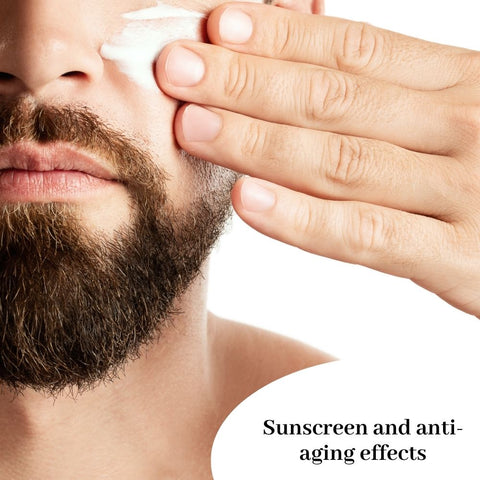
Sunscreen is essential for preventing premature ageing and shielding the skin from the harmful effects of ultraviolet (UV) radiation, both of which contribute significantly to skin ageing. Here's how sunscreen helps with anti-aging:
-
UV radiation from the sun affects the skin's collagen and elastin fibres, causing premature ageing indications such as wrinkles, fine lines, sagging skin, and uneven skin tone. Sunscreen prevents UV-induced photoaging by blocking or absorbing damaging UV radiation.
-
Sunscreen prevents UV-induced collagen breakdown, hence reducing the growth of wrinkles and fine lines. Collagen is a protein that keeps the skin tight and elastic, and UV radiation causes it to degrade, hastening the ageing process.
-
Sunscreen prevents hyperpigmentation, including sunspots, age spots, and melasma, by inhibiting UV-induced melanin formation. Melanin is the pigment that gives skin its colour, and UV radiation can cause overproduction, resulting in uneven skin tone and black patches.
-
UV rays destroy the skin's elastin fibres, which are necessary for maintaining suppleness and resilience. Sunscreen protects against elastin degradation, which helps to maintain skin firmness and prevent drooping and loss of elasticity caused by ageing.
-
Prolonged sun exposure can cause skin dryness, roughness, and dehydration, worsening the appearance of ageing. Sunscreen helps to keep skin hydrated by reducing moisture loss and supporting the skin's natural barrier function.
-
In addition to its anti-aging properties, sunscreen prevents skin cancer by blocking UV radiation, which is a major risk factor for skin cancer development. Regular sunscreen use lowers the incidence of both non-melanoma skin cancers (such as basal cell carcinoma and squamous cell carcinoma) and melanoma, the most deadly type of skin cancer.
-
Sunscreen protects the skin from UV damage and environmental aggressors, preserving its overall health and vitality. Healthy skin is more resistant to external stressors and retains its youthful appearance with time.
Sunscreen myths debunked
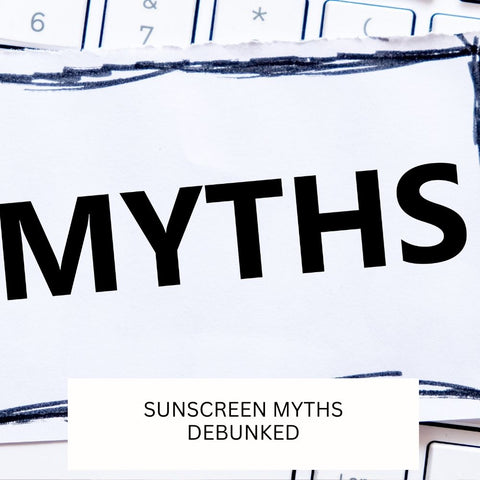
Let us debunk some common sunscreen myths:
-
Myth: You do not need sunscreen on cloudy days. Reality: Even on cloudy days, UV rays can penetrate and cause skin damage. It is critical to wear sunscreen every day, regardless of cloud cover.
-
Myth: Sunscreen is not necessary indoors. Reality: Although UVB rays, which cause sunburn, are mostly blocked by windows, UVA rays, which cause premature ageing and skin cancer, can still penetrate glass. It is still crucial to wear sunscreen if you spend a lot of time indoors in direct sunlight or if you work near windows.
-
Myth: If you have dark skin, you do not need sunscreen. Reality: Although darker skin tones have more natural UV radiation protection, they are still susceptible to sun damage such as sunburn, skin cancer, and premature ageing. Everyone, regardless of skin tone, should apply sunscreen.
-
Myth: Sunscreen prevents vitamin D production. Reality: Although sunscreen can reduce vitamin D synthesis in the skin, it does not completely prevent it. Most people can get enough vitamin D from their diet and incidental sun exposure while using sunscreen.
-
Myth: A higher SPF provides all-day protection. Reality: No sunscreen, regardless of SPF, offers all-day protection. Reapplication every two hours, or more frequently if swimming or sweating, is required to maintain protection.
-
Myth: Waterproof sunscreen is foolproof. Reality: No sunscreen is completely waterproof, and even water-resistant sunscreens must be reapplied frequently, especially after swimming or sweating.
-
Myth: Sunscreen Leads To Vitamin D Deficiency. Reality: Sunscreen does not cause vitamin D deficiency. Most people can get enough vitamin D from their diet and incidental sun exposure while using sunscreen.
-
Myth: Natural sunscreens are always safe. Reality: While natural sunscreens may contain mineral-based ingredients like zinc oxide or titanium dioxide, which sit on the skin's surface and reflect UV rays, they are not inherently safer or more effective than chemical sunscreens. The key is to select a sunscreen with broad-spectrum protection and an SPF suitable for your skin type and activity level.
You can maintain healthy, protected skin and make educated decisions about sun protection by comprehending and dispelling these widespread misconceptions about sunscreen.
































